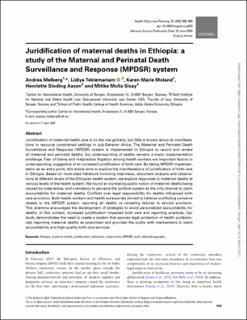| dc.contributor.author | Melberg, Andrea | |
| dc.contributor.author | Teklemariam, Lidiya | |
| dc.contributor.author | Moland, Karen Marie Ingeborg | |
| dc.contributor.author | Aasen, Henriette Sinding | |
| dc.contributor.author | Sisay, Mitike Molla | |
| dc.date.accessioned | 2021-05-07T13:29:02Z | |
| dc.date.available | 2021-05-07T13:29:02Z | |
| dc.date.created | 2021-03-03T14:08:03Z | |
| dc.date.issued | 2020 | |
| dc.identifier.issn | 0268-1080 | |
| dc.identifier.uri | https://hdl.handle.net/11250/2754226 | |
| dc.description.abstract | Juridification of maternal health care is on the rise globally, but little is known about its manifestations in resource constrained settings in sub-Saharan Africa. The Maternal and Perinatal Death Surveillance and Response (MPDSR) system is implemented in Ethiopia to record and review all maternal and perinatal deaths, but underreporting of deaths remains a major implementation challenge. Fear of blame and malpractice litigation among health workers are important factors in underreporting, suggestive of an increased juridification of birth care. By taking MPDSR implementation as an entry point, this article aims to explore the manifestations of juridification of birth care in Ethiopia. Based on multi-sited fieldwork involving interviews, document analysis and observations at different levels of the Ethiopian health system, we explore responses to maternal deaths at various levels of the health system. We found an increasing public notion of maternal deaths being caused by malpractice, and a tendency to perceive the juridical system as the only channel to claim accountability for maternal deaths. Conflicts over legal responsibility for deaths influenced birth care provision. Both health workers and health bureaucrats strived to balance conflicting concerns related to the MPDSR system: reporting all deaths vs revealing failures in service provision. This dilemma encouraged the development of strategies to avoid personalized accountability for deaths. In this context, increased juridification impacted both care and reporting practices. Our study demonstrates the need to create a system that secures legal protection of health professionals reporting maternal deaths as prescribed and provides the public with mechanisms to claim accountability and high-quality birth care services. | en_US |
| dc.language.iso | eng | en_US |
| dc.publisher | Oxford University Press | en_US |
| dc.rights | Navngivelse 4.0 Internasjonal | * |
| dc.rights.uri | http://creativecommons.org/licenses/by/4.0/deed.no | * |
| dc.title | Juridification of maternal deaths in Ethiopia: A study of the Maternal and Perinatal Death Surveillance and Response (MPDSR) system | en_US |
| dc.type | Journal article | en_US |
| dc.type | Peer reviewed | en_US |
| dc.description.version | publishedVersion | en_US |
| dc.rights.holder | Copyright the authors. | en_US |
| cristin.ispublished | true | |
| cristin.fulltext | original | |
| cristin.qualitycode | 2 | |
| dc.identifier.doi | 10.1093/heapol/czaa043 | |
| dc.identifier.cristin | 1895331 | |
| dc.source.journal | Health Policy and Planning | en_US |
| dc.source.pagenumber | 900-905 | en_US |
| dc.identifier.citation | Health Policy and Planning. 2020, 35 (8), 900-905. | en_US |
| dc.source.volume | 35 | en_US |
| dc.source.issue | 8 | en_US |

